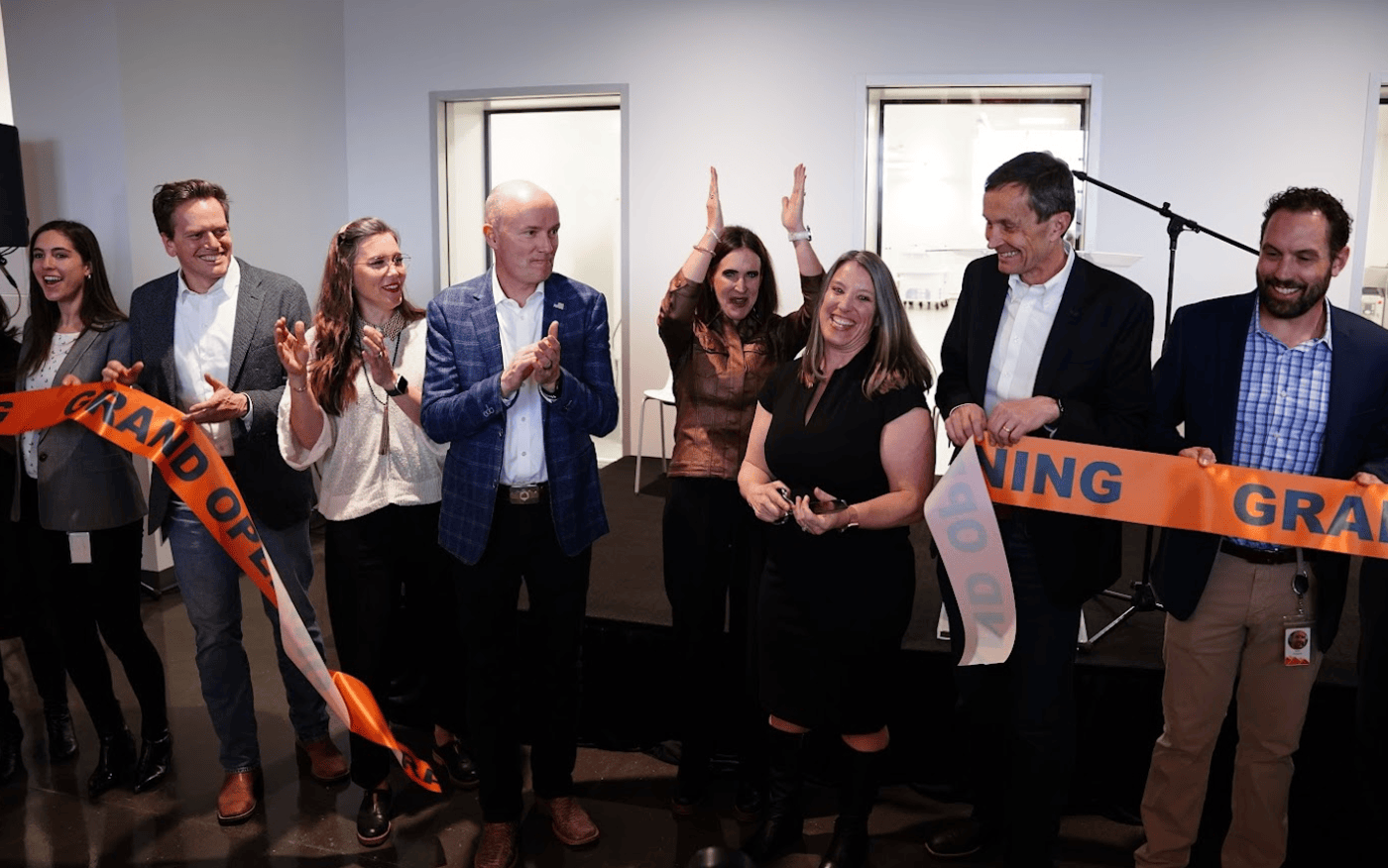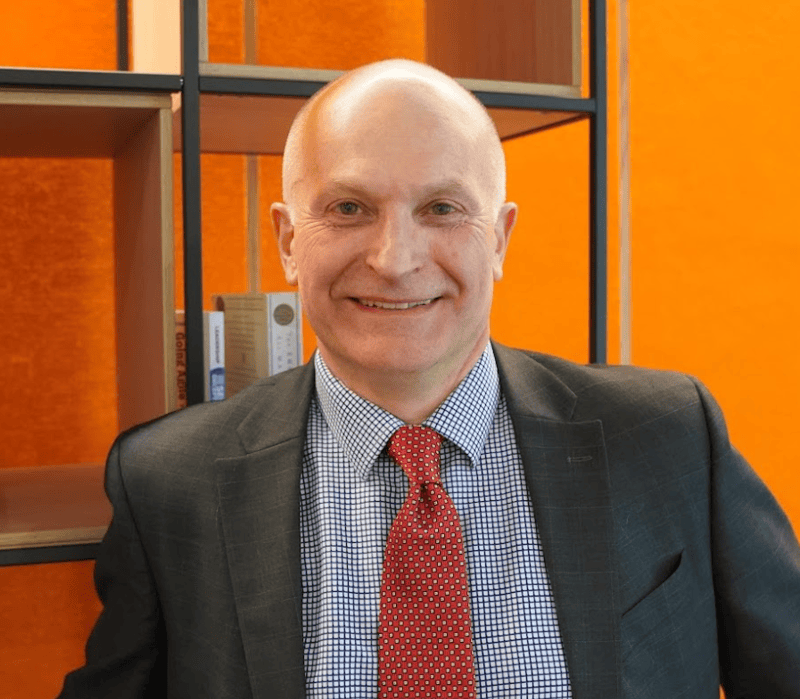

Salt Lake City, Utah - March 28, 2025
On March 27th, Denali Therapeutics, a leader in biotechnology focused on advancing therapeutics for brain diseases, officially opened its new 60,000-square-foot biomanufacturing facility in Salt Lake City, just west of Salt Lake City International Airport. The state-of-the-art site is designed with cutting-edge, efficient methods to meet the demands of modern biotech and was celebrated by local leaders, including Utah Governor Spencer J. Cox and Salt Lake City Mayor Erin Mendenhall.
Utah's Growing Role in Life Sciences
Governor Cox, a long-time advocate for the life sciences industry, highlighted the state’s growing prominence in this field. “Utah is punching far above its weight in the life sciences industry,” Cox remarked. “We’ve seen companies come here, and now we’re seeing even more. We’re becoming a hub for biotech, and it’s incredible.”

On a personal note, the governor shared the emotional impact of Denali’s work. “My dad was diagnosed with Parkinson’s six years ago, and I see firsthand the challenges he faces. But I also know that we are on the verge of breakthroughs. Companies like Denali are the dreamers and builders making those breakthroughs happen.”
Taking time off on his final day to sign or veto 582 bills, Governor Cox reflected on the significance of Denali’s mission and remarked how he would rather be at Denali's ribbon cutting: "I believe that it's a time to build in our country again. We've gotten away from that for far too long. We stopped doing the big things, the great things that once made this country so special. There's so much red tape. We've made it hard for people to do the things that will make life better for all of us. The things that will happen in this building will change the country, will change the world for the better, and we are all better off because of it.”
Erin Mendenhall, Salt Lake City Mayor
Mayor Erin Mendenhall remarked, "I get invited to a lot of ribbon cuttings. We're fortunate to be a growing state and a growing city, and that is a position I hope we get to enjoy for some time. But this ribbon cutting is absolutely unique because it isn't about the building; it is about the possibility of saving and improving the lives of children, families, and individuals—and doing it in ways that I hadn't yet imagined."

Mayor Mendenhall mentioned the loss of her own father to cancer when she was fourteen years old. She pointed out the connection to advanced therapies that were unavailable then but are now, thanks to medical advances being developed by companies like Denali: "He wouldn't have necessarily died because of medical and treatment breakthroughs that have happened since that day. Our welcoming of Denali into Tech Lake City and the incredible BioHive are the kinds of hopes and miracles that will save and improve lives for generations."
A Breakthrough in Drug Delivery
Denali’s cutting-edge research focuses on crossing the blood-brain barrier (BBB)—a longstanding challenge in treating neurodegenerative diseases like Alzheimer’s, Parkinson’s, and ALS. The BBB serves as a protective shield, blocking harmful substances but also preventing the delivery of vital therapeutics. Denali’s innovation involves a unique method to safely and effectively transport drugs across this barrier.

Ryan Watts, CEO and Co-Founder, Denali Therapeutics
Co-founder and CEO Ryan Watts, who started his academic journey as a student at the University of Utah and later earned a PhD from Stanford, played a pivotal role in discovering a solution involving a novel way of transporting or delivering needed therapeutics to the brain. While working at biotech giant Genentech in South San Francisco, Watts and co-founder Alex Schuth made a breakthrough in binding dynamics, identifying the transferrin receptor as the key to unlocking drug delivery. Transferrin, a protein that transports iron through the BBB, served as the natural vehicle for delivering therapeutics.

Watts explained, “We essentially hitch a ride with a natural substance—iron—using the transferrin receptor. This approach avoids disrupting the barrier, ensuring the brain remains protected while still enabling treatment for diseases.”
The company’s core innovation is the Transport Vehicle (TV)—a protein engineered to bind with the transferrin receptor. When fused with therapeutic enzymes, it allows drugs to bypass the blood-brain barrier and reach their target areas in the brain, offering new hope for conditions that currently have no cure.
An Academic and Industry Partnership
Since its founding, Denali has maintained a strong connection to the University of Utah, where Ryan Watts studied as an undergrad. The company has been an active supporter of the university’s Department of Chemical Engineering, helping train a highly skilled workforce for biomanufacturing. Watts himself also teaches at the university, underscoring his commitment to education and the biotech sector.
“I’ve taught biotech for five years at both Stanford and the University of Utah. It’s an industry-driven field, and while we can teach the terminology and basic concepts, real learning happens on the job,” Watts explains.
"There are certain Biotherapeutics that Denali is developing for neurodegenerative diseases," said Mikhail (Misha) Skliar, the professor at the University of Utah who manages the unique ‘Deep Tech’ Education Initiative involving Denali, U of U students (currently five but soon to expand), biotherapeutics manufacturing, innovation and entrepreneurship.

Dr. Skliar and Dr. Tom Zangle are teaching and supervising a cohort of students studying Chemical Engineering. Enrolled in a Monoclonal Antibody Biomanufacturing Course at the University of Utah and also a part of Utah System of Higher Education's Deep Technology Talent Initiative that is designed build workforce capacity in high-tech fields including Biotherapeutics.
The new Utah Workforce for Biotherapeutics (UWB) Deep Tech Initiative, in concert with Denali Therapeutics, will support educational programs to give Chemical Engineering students at the University of Utah needed training to produce biologics at scale.

"Fundamentally, we're teaching students and enabling research in this new type of therapeutics, for both treating disease and maintaining health. We feel that there is a market for students to be involved because we think this initiative is going to grow quite substantially. The students in this program will get to do things researchers are doing here at Denali—on a smaller scale—but using similar equipment and similar processes. This is an exciting part of their education."
Maxim Balitskiy, a chemical engineering major at the University of Utah and a member of the current team of deep tech students collaborating with Denali, noted the importance of companies like Denali in inspiring the next generation of biotech professionals. Balitskiy started his career in semiconductor manufacturing and more recently shifted his focus to biomanufacturing.
"I believe that classes like this, where students get hands-on and industry conducive experience are not only good for students like us, but also grant benefits to the companies that students eventually go into," said Balitskiy. "I’m really excited to see what Denali has going on, and I’m thankful for the opportunity to see their state-of-the-art facility open up!"

The Utah Workforce for Biotherapeutics (UWB) Deep Tech Initiative has received support from local and national leaders in life sciences and biomanufacturing. Below is the composition of its advisory board:
- Leah Frautschy, VP of Clinical Manufacturing at Denali Therapeutics (pictured above with the scissors at the ribbon cutting)
- David Northrup, VP of Manufacturing & Supply Chain at Recursion Pharmaceuticals
- Michael Stubblefield, President and CEO of Avantor
- James DeKloe, Distinguished Professor of Biological Sciences, Biotechnology, and Biomanufacturing at Solano College
- Uma Lakshmipathy, Site Head at Patheon Translational Services, Senior Director of R&D, Science & Technology, Pharma Services Group at Thermo Fisher Scientific
- Benjamin Madsen, Manager of R&D Processing Labs in Bioproduction and Single-Use Technologies at Thermo Fisher Scientific
- Robert Ohgami, VP and Chief Medical Director at the Institute for Research and Innovation in Diagnostic and Precision Medicine, ARUP
- Eric Eddings, Professor and Chair of the Chemical Engineering Department
- Tom Zangle, Associate Professor of Chemical Engineering and co-Principle Investigator of the Program
- Misha Skliar, Professor of Chemical Engineering and Principle Investigator of the Program
- Blake Goff, Board Chair and VP of Manufacturing at Seagen (retired)
Looking Ahead
Denali Therapeutics is poised to revolutionize the treatment of brain diseases. With its new Salt Lake City facility, the company is positioning itself as a leader in the biotech space. Backed by strong academic ties, cutting-edge research, and a clear vision for the future, Denali is not just advancing science—it’s changing lives.
Alex Schuth, Co-Founder & CFO/COO, Denali Therapeutics
“We're working across a spectrum of diseases, starting with the major conditions—Parkinson's, ALS, Alzheimer's disease, and frontotemporal dementia (FTD)," said co-founder Alex Schuth.

"On the other end of the spectrum," Schuth added, "we’re also targeting rare pediatric diseases, such as Hunter syndrome and Sanfilippo syndrome. These are rare genetic disorders caused by gene defects leading to enzyme deficiencies. In these children, a missing enzyme impairs critical brain function. Our approach involves substituting the missing enzyme and delivering it across the blood-brain barrier to restore its function in the brain.”
In the coming weeks Denali will be submitting its first Biologics Licensing Application (BLA) of its first biologics product to the FDA. TechBuzz will post updates on the company's developments and progress.

For more information visit Denali Therapeutic's website.
Also, see instructive video below showing Denali Therapeutic's novel approach to treating brain diseases:

